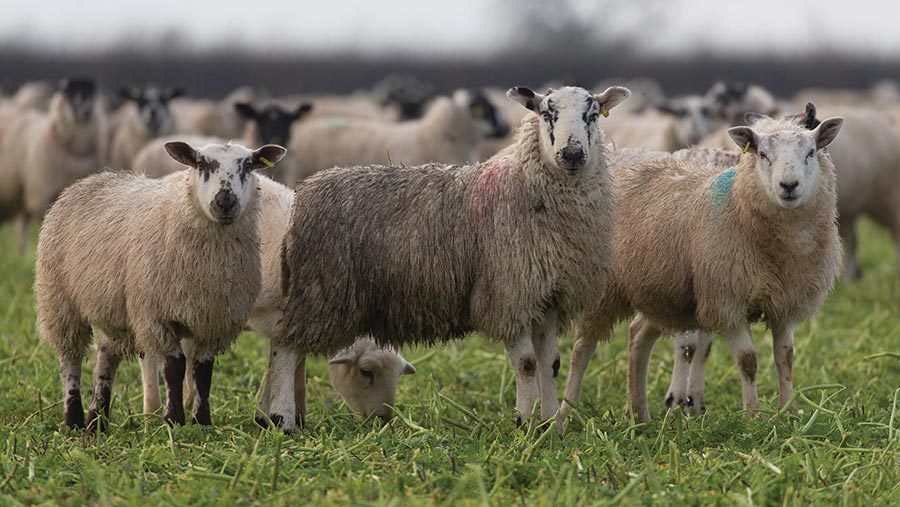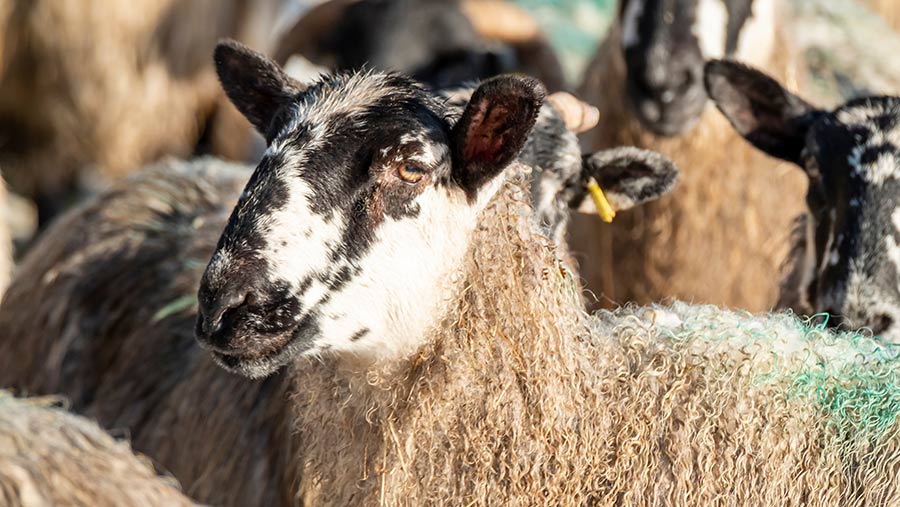Sheep flock health: Government schemes and farmer priorities
 © Tim Scrivener
© Tim Scrivener Disease does not respect borders, so it is incumbent on the whole industry to take a strict stance towards protecting flock health.
Sheep breeder and National Sheep Association (NSA) trustee Charles Sercombe says health is key to helping the sheep sector improve productivity and profitability while reducing its environmental footprint.
Below, devolved government’s approaches to animal health as part of future farming policy are summarised (see table), and farmers and consultants reveal their priorities for flock health.
See also: Advice for buying rams and observing quarantine protocols
National approaches to flock health |
|||
|
Scheme |
What is it? |
What does it include? |
How to apply |
|
The Animal Health and Welfare Pathway (England) |
Provides funding of up to £436 for a flock health vet visit. Opened on 17 February 2023 |
|
Apply on the government website. |
|
Preparing for Sustainable Farming, Animal Health and Welfare Interventions (Scotland) |
Launched this year and runs until the end of 2024
Funding of up to £1,250 over the two years (£250/action, including £250 in year one for CPD) |
The focus is on the investigation of:
|
No need to apply in advance. Claim based on evidence of investigation provided by vet |
|
Sustainable Farming Scheme, Animal Health and Welfare Actions (Wales) |
Expected to launch in April 2025 as part of Sustainable Farming Scheme
Funding still unclear |
Focus will be placed on:
|
To be confirmed |
|
Note: Northern Ireland differs in its approach to animal health. In 2012, it launched Animal Health and Welfare Northern Ireland, with support from farm organisations rather than the government, and works closely with Animal Health Ireland. It has already spearheaded control programmes for BVD eradication, Johne’s and parasite control and is helping farmers to improve farm biosecurity. Sources: Peter Howard, Welsh Government; Jenny Purcell, Scottish Government; Martin Jenkins, Defra; and Dr Sam Strain from Animal Health and Welfare Northern Ireland. |
|||
Farmer views
Gwyn Johnson, Maes Bach Farm, Pontypridd
Since taking part in Hybu Cig Cymru’s Stoc+ programme, Gwyn has lowered lamb losses by 8%.
As part of the three-year programme, Gwyn received funding towards a bespoke animal health plan with his vet.
Together, they decided to focus on three actions, and have:
- Reduced lamb losses from 15% to 7% by metabolic profiling of ewes and improving protein levels in their diet
- Lowered lameness from 10% to negligible levels by adopting the five-point plan for lameness and being ruthless at culling repeat offenders – 75 sheep in the first year alone
- Identified iceberg diseases such as Johne’s and Borders, which were neglible. Gwyn is continuing to monitor these and now sources stock from one high-health, closed flock.
Gwyn, who farms 500 breeding ewes across 89ha (220 acres), endorses working closely with vets.
He believes producers need to take quarantine more seriously. “A lot of farmers do not quarantine their rams. Part of that is because sales are too late in the season, but for me, quarantine is gold standard.”
Lorraine Luescher, Langholm, Scottish Borders
Lorraine is working hard to raise awareness of the contagious lung tumour ovine pulmonary adenocarcinoma (OPA), after she found the disease in a bought-in ram.
She keeps 3,000 South Country Cheviots and Blackfaces on her upland farm and says the wider ramifications this had for flock health were devastating.
She has been scanning her Blackface flock for five years at a cost of £1,400/year to detect the disease. In combination with culling positive animals, this has lowered disease prevalence from 6% to 2%.
She is part of a government-backed working group to deliver change and urges other farmers not to bury their heads in the sand.
She said: “Breeders of high-value tups are in denial about disease in their flocks. They believe their genetics are so valuable they can’t bring themselves to scan and cull.
“In the absence of a vaccine, I would like to see all breeding sheep scanned [for OPA] with a card system that states how many years [farmers] have been scanning [to give buyers and sellers confidence].”

© Lukassek/Adobe Stock
Consultant views
Fiona Lovatt, sheep vet from Flock Health
“Vaccinations are not cheap, but disease is more expensive,” said Fiona.
She advised farmers to work with their vet to test and establish their health status and use vaccination and quarantine as tools to protect their flock.
She said having a flock hierarchy by keeping “clean” and “dirty” flocks could help with disease management, for example, keeping yearlings in a separate group from other sheep.
Janet Roden, sheep geneticist, Innovis
Quoting Benjamin Franklin, Janet encouraged farmers to “buy not on optimism, but on arithmetic”.
“When we invest in stocks and shares, we use arithmetic. We should be doing the same with breeding stock [because it is] an investment in the future and adds up just like compound interest.
“Ask breeders about their system, [flock] health status and use performance data such as EBVs [estimated breeding values]. Use all the tools you can to make wise investments.”
Emily Grant, Forrit Consultancy
“Sometimes, focusing on health alone isn’t enough.
“Health is part of the jigsaw puzzle, but it is important to build a full picture and look at how it is being influenced by all the elements of your production system,” said Emily.
She explained nutrition and good pasture management heavily influence health and other areas such as productivity and subsequent profitability.
She added: “We know that sheep that have better nutrition are better able to withstand worm burdens, for example.”
She encouraged farmers to make the most of free energy from the sunlight to maximise their use of high-quality pasture to drive health and, in turn, profitability.
Take-home messages
- Work closely with your vet to develop a flock health plan, use it and review it regularly
- Consider the role improvements in genetics and nutrition can play
- Screen your flock for at-risk diseases
- Quarantine incoming stock
This report was written from the National Sheep Association’s inaugural Sheep Farmers’ conference at the National Conference Centre, Solihull, on 25 October.
